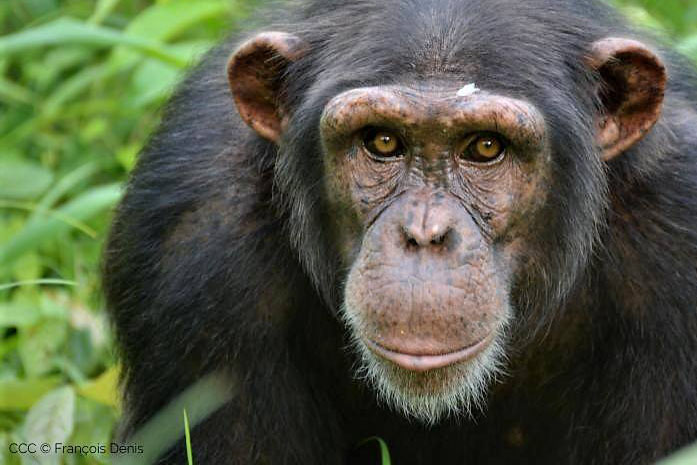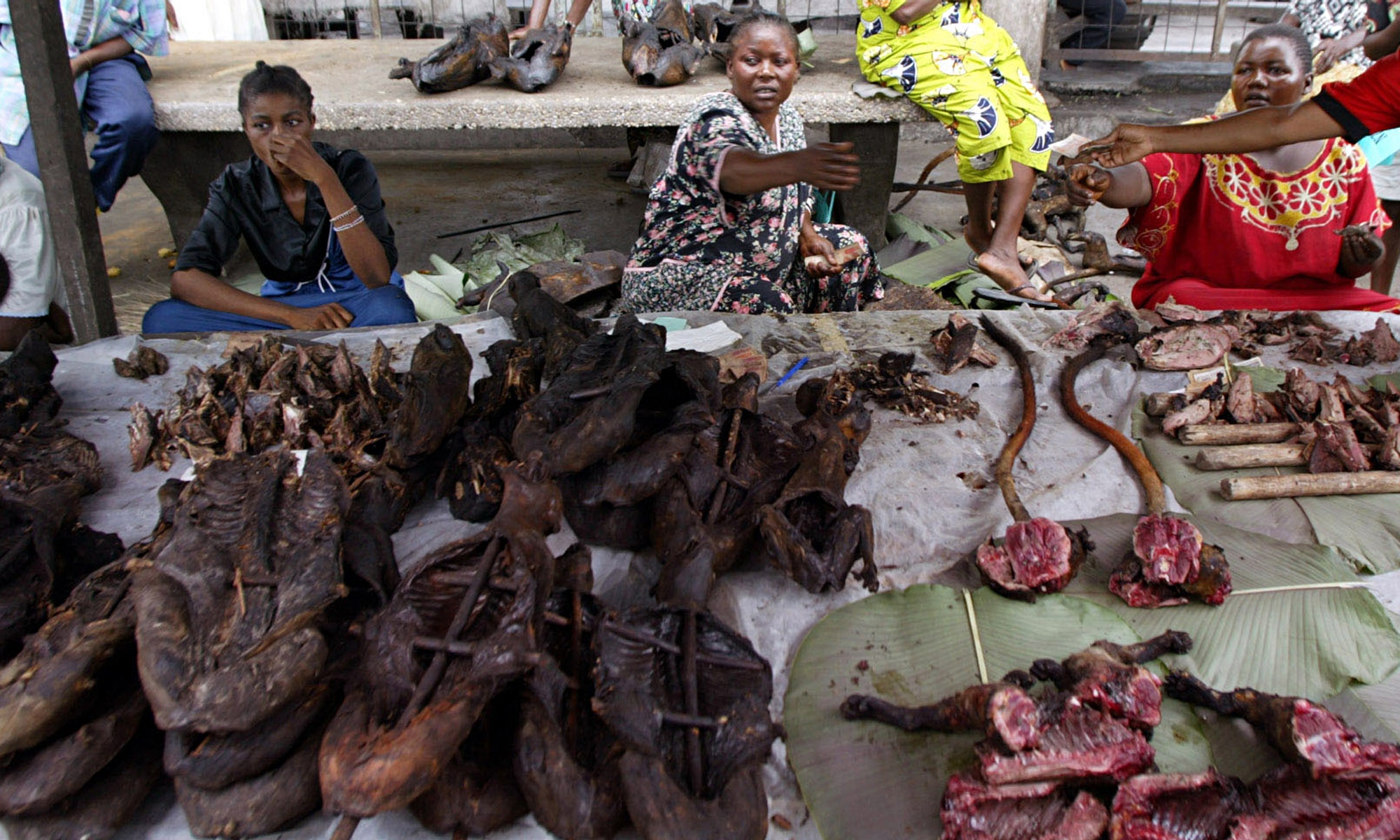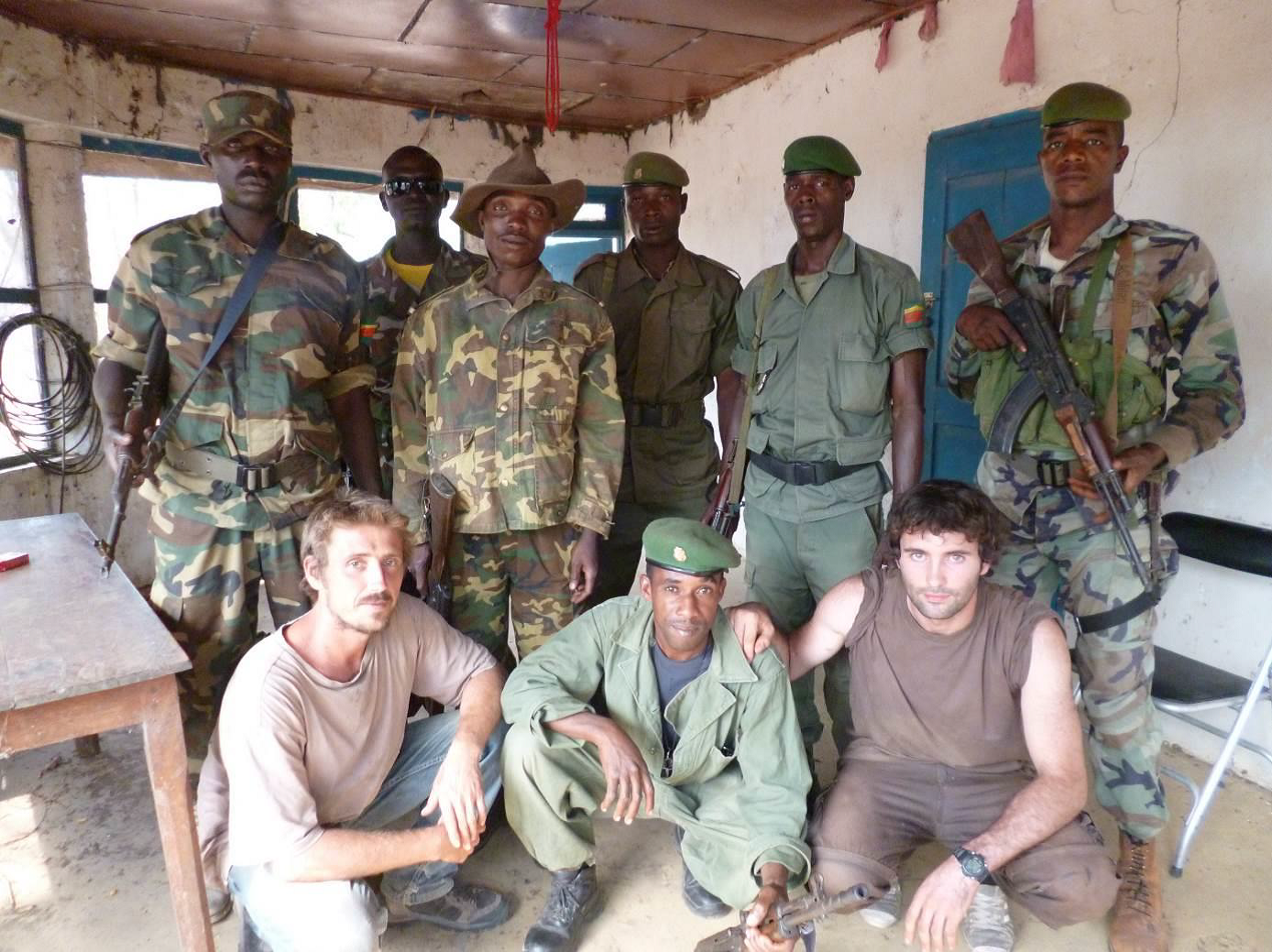A Coalition to Disrupt the Wildlife Trade
Action for Chimpanzees represents a new way to fight conservation battles – by working together.
By Jean Fleming
Each year, thousands of chimpanzees disappear from their home forests in Africa. The older animals are hunted for bushmeat, and the babies left behind are captured and trafficked by criminal syndicates as part of the multi-billion dollar illegal wildlife trade. This activity happens across chimpanzee rangeland countries, and historically, each country has taken different measures to address the problem. But now, a ground breaking program seeks to disrupt this trade by addressing the many different facets of it holistically.
The Action for Chimpanzees initiative, funded by a grant from U.S. Department of State’s Bureau of International Narcotics and Law Enforcement Affairs (INL), is one of the first civil society-government partnerships where front-line sanctuaries and conservation organization take the lead in combating chimpanzee poaching and the broader illegal wildlife trade. Partners in this program are: Tacugama Chimpanzee Sanctuary (Sierra Leone); Liberia Chimpanzee Rescue and Protection (LCRP – Liberia); Project Primates Chimpanzee Conservation Center (Guinea); Akatia (Côte D’Ivoire); Comoé Chimpanzee Conservation Project (Côte D’Ivoire) and two wildlife law expert groups, Legal Atlas and the Global Law Alliance for Animals and Environment.
Action for Chimpanzees takes a systemic approach to disrupting the trade, bringing together all with a vested interest in the outcome: key stakeholders in governments, law enforcement, and judiciary systems, as well as local communities and wildlife centers. By focusing on chimpanzees – one of the species most sought after by wildlife crime syndicates – this program will build regional capacity to tackle wildlife crime in general and disrupt a wide network of wildlife crime activities.
The program’s goal is to reduce the poaching and trafficking of chimpanzees originating from or transiting through West Africa. Building on the existing partnerships between PASA, local chimpanzee sanctuaries, and government agencies, the program will use data-driven approaches to improve the prevention, interdiction, and prosecution of wildlife trafficking as well as increase transparency and collaboration between agencies and organizations in the region. AFC will also use innovative genetic geolocation of confiscated chimpanzees to identify poaching and trafficking hotspots. The increased capacity of local frontline groups and government agencies will ensure greater protection for chimpanzees and other wildlife from the threat of poaching and trafficking. The anti-poaching supplies will strengthen the protection of chimpanzees in the wild and other wild animals who share the same protected areas.
“This coalition is breaking new ground in regional solutions to the illegal trade in chimpanzees in West Africa,” said Iris Ho, Head of Campaigns and Policy for PASA, who is leading the program. “Our partners have invaluable frontline knowledge of protecting endangered species from exploitation that, when shared, will accelerate transformational change across the continent.”
Together, the sanctuaries and partner organizations bring decades of experience in combating poaching and chimpanzee trafficking as well as expertise in caring for rescued chimpanzees. They also have deep connection with and understanding of their local communities and long-standing relationships with governments – critical assets for the success of the program.
“At Tacugama, we are proud that we have been able to collaborate with the Government of Sierra Leone to declare the Western Chimpanzee as the National Animal of the country,” said Bala Amarasekaran, founder of Tacugama Chimpanzee Sanctuary. “This project serves as a timely intervention as we must now see how other aspects can complement this declaration. The time is right for people to be trained on laws, fines and more, so we can truly protect chimpanzees in Sierra Leone.”
Addressing Laws and Law Enforcement
Dismantling wildlife trafficking syndicates requires several moving parts to come together. AFC seeks to build capacity around this on all levels. This means both working with legislative and judiciary entities to institute adequate deterrent to wildlife crime offenders, and training law enforcement officials to enforce them. Representing a front line in prosecuting wildlife crime, police, customs officers, wildlife authorities, and anti-corruption agency officials will deepen their knowledge of CITES[1] regulations, national wildlife laws and other applicable criminal statues, develop skills in species identification and techniques for confiscating live animals.
James Wingard, the co-founder of Legal Atlas sees it as a question of making connections between seemingly unrelated issues. “As wildlife crime does not tend to occupy a priority position for law enforcement units,” he said, “training is of paramount importance to unveil its true connection with transnational organized crime networks. Training will increase readiness of those law enforcers working in strategic and under resourced areas such as borders, seaports and protected areas to succeed in the detection, interdiction, seizure, and investigation of wildlife crimes.”
Training judiciary officials and prosecutors is the next prong in the program. Ensuring that effective laws are enforced, and that prosecutors in each country can appropriately prosecute and sentence wildlife crime perpetrators will lead to an increase in the number of prosecutions in each country.
“Challenging legal frameworks and an underappreciation for the gravity of wildlife crime can impede prosecutorial action and convictions,” said Erica Lyman, Clinical Professor and Director, Global Law Alliance for Animals and the Environment at Lewis & Clark Law School. “Specialized training equips prosecutors and judges to identify and overcome common pitfalls, including evidentiary challenges and charging barriers. Such trainings help create a justice system that holds traffickers accountable and respects human rights.”
Sanctuaries are Integral to Stopping Wildlife Exploitation
The integral role that wildlife centers play in the global movement to combat the illegal wildlife trade is vital and has only recently been acknowledged. Sanctuaries work with local law enforcement to confiscate wildlife and provide expert care for the seized animals. In West Africa, a recent USAID field report document noted that wildlife centers are leaders in efforts to intercept wildlife traffickers, and recognized that, without these centers, confiscation of live animals, and thus prosecution of traffickers, would not be possible[2]. Governments do not have appropriate facilities to house confiscated live wildlife and officials are often unwilling to seizw animals without a facility in place to keep them. Having worked on the ground for decades, these centers have crucial insights into local and regional trafficking networks, routes, and the barriers that exist in combating the trade, as well as established relationships with government agencies involved in fighting it.
“Working in the field directly with the wild chimpanzees, in collaboration with local authorities and park rangers, makes us realize that we have to do all possible efforts to tackle chimpanzee trafficking to prevent these dwindling wild populations extinction. We are confident that this collaboration with PASA and all the other conservation partners will strengthen law enforcement capacities and help strengthen chimpanzee conservation in West Africa, ” said Juan Lapuente, founder of Comoe Chimpanzee Conservation Project
The program will also provide equipment needed to stop wildlife crime. Several partners are already conducting anti-poaching activities in critical chimpanzee habitat. Updated equipment can dramatically increase the efficacy of these activities, including GPS units and camera traps.
“We are excited to partner with the INL and our sister rescue centers in West Africa to continue our important work protecting and conserving chimpanzees,” said Jenny Desmond, founder of the Liberia Chimpanzee Rescue & Protection. “With chimpanzee populations in rapid decline, this kind of support and collaboration is critical in the fight to save our closest cousins.”
“Educating authorities on the importance of protecting endangered species such as chimpanzees is the critical first step in the fight against the illegal wildlife trade. In Cote d’Ivoire, most educational efforts are aimed at wildlife officials, but AFC will widen the net to ensure that all authorities involved in investigation, arrests and prosecutions of traffickers understand the importance of species preservation, ” said Sarah Crawford, co-founder and president of Akatia.
While this program focuses on the epidemic of trafficking in West Africa, it’s PASA hope that it can form a model that can be replicated in other areas, and for other species.
“The coalition we’ve built – frontline sanctuaries and conservation groups, government partners, wildlife genetic experts, and international legal experts joining forces – represents a new way to fight conservation battles,” said Iris Ho. “Action for Chimpanzees is one such approach, and it’s our hope that our innovative model, highlighting the essential role that sanctuaries play in protecting endangered species and combating wildlife crime, will save not only chimpanzees but also countless other wild animals . With so much at stake, we must find new ways to work together. There is simply no time to waste.”
[1] The Convention on International Trade in Endangered Species of Wild Fauna and Flora
[2] Republic of Liberia Forestry Development Authority, 2019. Understanding Threats to West African Biodiversity and Linkages to Wildlife Trafficking: Liberia Field Assessment Report. Edited by Balinga M. and Stroud A in 2019.

Chimpanzees are among the most sought after animals by wildlife traffickers.
Photo courtesy of Chimpanzee Conservation Center (CCC).

Illegal primate trafficking is connected to the bushmeat trade. It’s estimated that for every one ape taken from the wild, at least 10 have been killed to be sold as bushmeat or for animal trophies.

Action for Chimpanzees takes an integrated approach to the challenge of wildlife trafficking, which includes working with law enforcement, the judiciary, and local governments.
Photo courtesy of CCC.
